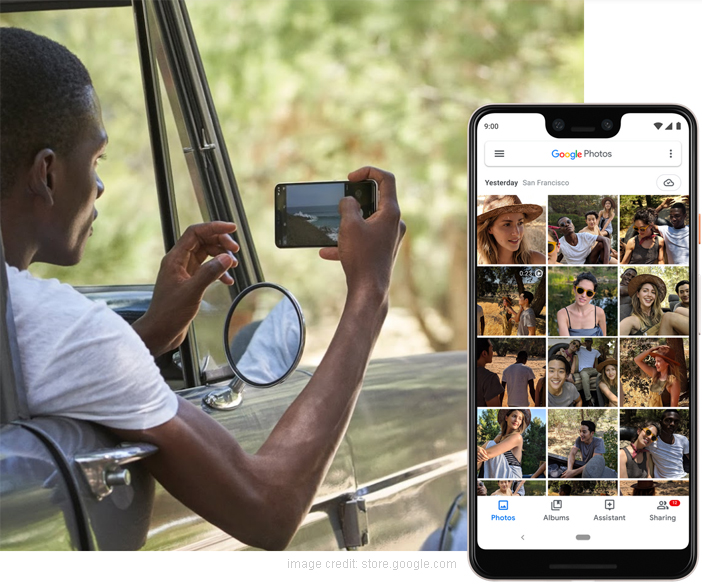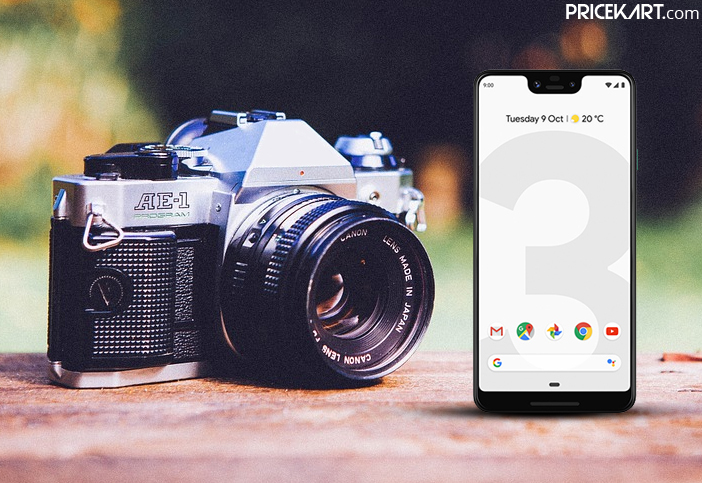A couple of decades back, photography was all about a simple cardboard box with a lens and a roll of film. Full speed ahead to today and you will see the revolution camera technology has made. In the current day, we are spoilt for choices. We have different types of cameras, various technologies and a wide range of brands offering products at a competitive price. Additionally, with so many different types of cameras being designed specifically for a user’s needs and usage, it is easy to get confused while making a decision. Here are some of the cameras available currently:
- Compact Digital Cameras (or in other words – Point and Shoot Cameras)
- DSLR Cameras
- Mirrorless Cameras
- Action Cameras
- 360 Cameras
- And, Film Cameras
In this blog post, you will get a clear idea about which camera type suits your photography needs. We will be discussing the four most common types of cameras – smartphone camera, point and shoot camera, DSLR camera and Mirrorless camera. Before taking a look at the differences between these types of cameras, here are some of the questions you need to ask yourself before buying a camera:
- Why do you need a camera?
- How and when will you use it?
- What purpose will the photographs be used for?
- What is your budget?
- How much control will you require?
- Will you be printing the photographs?
Having the answer to these questions will make it easier for you to narrow down on the type of camera that perfectly suits your requirements. Now, let’s take a look at the different types of cameras most commonly used.
Smartphone Cameras

A couple of years back, no one would have considered using a smartphone for photography. However, times have changed. With every passing year, the camera functionalities on smartphones have improved. We all have our smartphones by our side 24 hours a day. The latest mobile phones come with excellent cameras. If you require a camera for decent quality pictures, that you aren’t going to print, then a smartphone works just great. In fact, with the rise of smartphone cameras, the sales for digital cameras have reduced, especially for interchangeable lenses.
This graph by Statista reveals that smartphone cameras have taken over the photography market. As smartphone cameras are becoming better, more and more users are depending on it. Among all the different types of cameras in the market, smartphones are leading in today’s time.
Pros of Using a Smartphone Camera
- Smartphone cameras are convenient to use as they are with 24X7
- Clicking, editing and posting is much easier and quicker on a smartphone
- High-end smartphones can capture amazing low-light pictures
- Apart from the camera, smartphones can be used for various other tasks
- Taking selfies is easier on smartphones
Cons of Using a Smartphone Camera
- Lesser control over exposure settings
- Access to a limited number of settings and features with a smartphone
- If you do not own a good camera mobile phone, chances are that you will get low-quality images
- Using the zoom reduces the quality of the photo
Best Smartphone Camera Suggestion – Google Pixel 3 (Huawei P20 Pro comes in a very close second)
| Google Pixel 3 Specifications | Best Camera Features on Google Pixel 3 |
| Rear Camera 12.2MP | Super Res Zoom for zooming in on the subject without disturbing the quality |
| Rear Camera Aperture f/1.8 | Amazing night mode for low light photography |
| Front Camera 8MP + 8MP | The phone is designed with lots of manual control |
| RAM 4GB | Enhanced HDR+ and Portrait mode |
| Storage 64GB & 128GB | Motion Auto-Focus feature for keeping a moving subject in focus |
| Video Recording Yes | 4K Video recording with 3840 x 2160 pixels at 30fps |
Point and Shoot Cameras
Compact digital cameras or point and shoot cameras are more or less like smartphone cameras. However, these cameras are definitely an upgrade from smartphone cameras. Like the name already says, you have to point the camera towards your subject and click; these cameras are very user-friendly. Additionally, these cameras offer more control over settings such as exposure, white light, zoom, focus and much more. But, even point and shoot cameras have certain limitations.
Pros of Using a Point and Shoot Camera
- Extremely easy to use
- These cameras are small, compact and budget-friendly
- Flexible and versatile zoom lens
- The Auto mode captures brilliant pictures
- With fixed lenses, you don’t have to trouble yourself with adding or changing lenses
- These cameras come with a massive depth of field
Cons of Using a Point and Shoot Camera
- The image quality is as equal to smartphone cameras
- Very limited point and shoot cameras allow manual controls
- These cameras are slow and cause shutter lag
- Night or low-light photography isn’t great
Best Point and Shoot Camera Suggestion – Fujifilm X100F
| Fujifilm X100F Specifications | Best Camera Features on Fujifilm X100F |
| Sensor APS-C CMOS | Amazing style and build quality |
| Camera Megapixels 24.3MP | Image quality is as good as high-end DSLR cameras |
| Lens 23mm f/2 | A built-in ISO dial for quick adjustments in the camera menu |
| Monitor 3.0-inch fixed, 1,040,000 dots | Six auto-focus modes designed for capturing various scenes |
| Viewfinder Hybrid optical/EVF | An optical and electronic hybrid viewfinder |
| Burst Speed 8fps | Tactile external controls |
| Video Recording Resolution 1080p | Superb wide aperture lens |
DSLR Cameras
We have all heard as well as dreamt of owning a DSLR camera. DSLR or Digital Single Lens Reflex cameras are the best cameras currently. They are known for capturing high-quality images and offer a lot of manual controls. Moreover, these cameras come with advanced sensors and a wide range of interchangeable lenses. DSLR cameras will not just let you capture sharp and terrific pictures with Bokeh background, but will also let you shoot high-quality videos. These cameras are the best pick if you want to capture professional level images or print the photographs. Furthermore, if you do not want to spend too much, you can also choose from the various DSLR Cameras below 25000.
Pros of Using a DSLR Camera
- Large sensors for capturing sharp and flawless pictures
- Interchangeable lenses. Some of the choices include – wide angle, macro, telephoto and zoom lens
- Full manual controls
- Large sensors for better resolution and impressive low-light photography
- Faster accurate autofocus for capturing action, sports and wildlife photography
- Quick autofocus and minimal shutter speed lags
- Optical viewfinder to take a look at the pictures you have captured
Cons of Using a DSLR Camera
- DSLR cameras are extremely large and bulky, making them difficult to hold
- These cameras are highly expensive
- Takes time to get a hang of the features and functionality
- The live-view screen on certain models is a little slow
Best DSLR Camera Suggestion – Nikon D850
| Nikon D850 Specifications | Best Camera Features on Nikon D850 |
| Sensor Full Frame | Built with high-end processing power |
| Camera Megapixels 45.7MP | In spite of a high-end build, the camera is compact to fit your hands comfortably |
| Autofocus 153-point AF, 99 cross-type | With a large 45.7MP sensor, you can rest assured that images will be stunning & sharp |
| Monitor 3.2-inch tilting touchscreen | Extremely quick viewfinder autofocus |
| Viewfinder Pentaprism | Use the ‘Focus Shift Mode’ to click pictures with remarkable depth of field |
| Burst Speed 7fps | Turn on the ‘Silent Photography’ mode to capture pictures without any sounds or clicks |
| Video Recording Resolution 4K | Shoot out-of-the-world 4K videos or extremely detailed 8K time-lapse sequences |
Mirrorless Cameras
A lot of people mistake Mirrorless cameras as DSLR cameras. However, there are a lot of differences between DSLR and Mirrorless cameras. These types of cameras are relatively new to the market. Mirrorless cameras are an enhanced version of point and shoot cameras, at the same time they are a compact version of DSLR cameras. Like the name says it all, these cameras come without an internal mirror. The absence of the mirror makes these cameras exceptionally lightweight and compact. Additionally, these cameras support interchangeable lenses.
Pros of Using a Mirrorless Camera
- Small, lightweight and compact compared to the bulkier DSLR cameras
- The electronic viewfinder gives you a preview of a shot on-screen
- Pictures can be captured with fast shutter speeds
- Usage and mechanical controls are much simpler to understand
- Along with offering a wide range of features, these cameras capture extremely good quality images
- These cameras are great for capturing fast shots such as wildlife and sports
Cons of Using a Mirrorless Camera
- The battery life is a little disappointing on Mirrorless cameras
- The availability of interchangeable lenses is limited
- The electrical viewfinder is not completely dependable
- Lastly, the autofocus speed is much slower than DSLR cameras
Best Mirrorless Camera Suggestion – Fujifilm X-T3
| Fujifilm X-T3 Specifications | Best Camera Features on Fujifilm X-T3 |
| Sensor APS-C | Easy to use with simple mechanical controls |
| Camera Megapixels 26.1MP | The 26.1MP camera sensor captures exceptionally sharp and vivid pictures |
| Autofocus 425-point AF | The camera is designed beautifully and it comfortably fits the hand |
| Monitor 3-inch three-way tilt touchscreen | Quick autofocus with strong tracking |
| Lens Mount Fujifilm X Mount | A new X-Trans sensor which is dedicated for reliable noise control |
| Burst Speed 11fps | The autofocus covers the entire image area |
| Video Recording Resolution 4K | Record amazing 4K videos at 60fps |
Conclusion: Different Types of Cameras
After seeing the different types of cameras available in the market, their pros and cons, it will be easier for you to make a choice. Based on your needs and requirements, pick a camera that perfectly suits you. If you are going to require professional level pictures, then DSLR and Mirrorless cameras are the best picks. On the other hand, if you just need high-quality images for basic photography needs, then smartphones and point and shoot cameras are the best choices.
